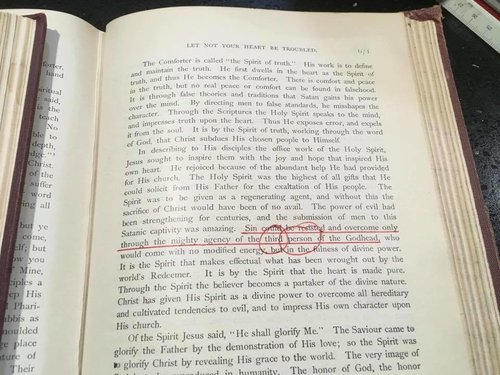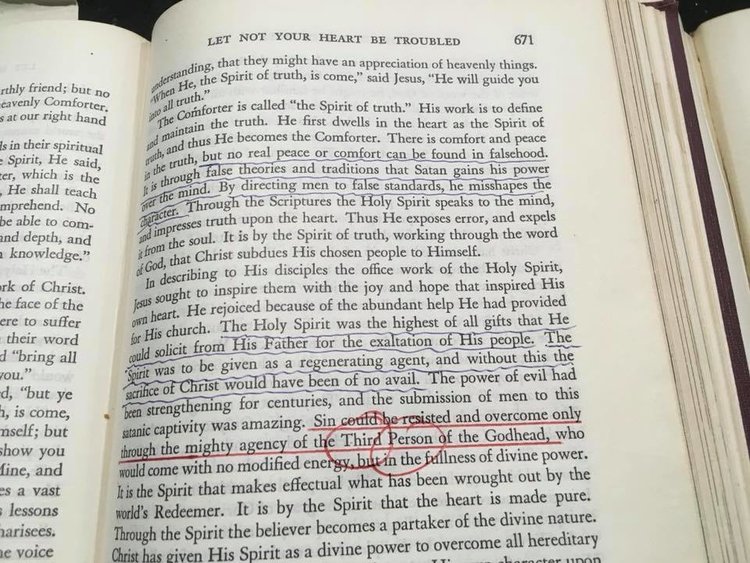Desire of Ages, p. 671.2
The assumed trinitarian phrase is, "The mighty agency of the Third Person of the Godhead." The full DA 671.2 quote reads as follows (emphasis supplied):
DA 671.2: In describing to His disciples the office work of the Holy Spirit, Jesus sought to inspire them with the joy and hope that inspired His own heart. He rejoiced because of the abundant help He had provided for His church. The Holy Spirit was the highest of all gifts that He could solicit from His Father for the exaltation of His people. The Spirit was to be given as a regenerating agent, and without this the sacrifice of Christ would have been of no avail. The power of evil had been strengthening for centuries, and the submission of men to this satanic captivity was amazing. Sin could be resisted and overcome only through the mighty agency of the Third Person of the Godhead, who would come with no modified energy, but in the fullness of divine power. It is the Spirit that makes effectual what has been wrought out by the world's Redeemer. It is by the Spirit that the heart is made pure. Through the Spirit the believer becomes a partaker of the divine nature. Christ has given His Spirit as a divine power to overcome all hereditary and cultivated tendencies to evil, and to impress His own character upon His church.
"Third Person" was originally published in lowercase. For the first 40+ years of the Desire of Ages publication (from 1898 up until 1939) the phrase "Third Person" was in lowercase (i.e. "third person"). Then, from 1940 and onward it was changed to "Third Person." In the book Evangelism (Ev 617.2) published in 1946, "third person" is quoted in lowercase while the subtitle is in uppercase, indicating that the (trinitarian) transition was already occurring.
Here is the pre-1940 edition of DA 671:

And below is DA 671 from 1940 and to the present:

The above change is further documented in the following article: Who is the Third Person of the Godhead?.
Godhead and Person. Besides tampering with casing, there is also a misunderstanding of the two key words: Godhead and Person.
Godhead as deity or divine nature. It turns out, Godhead in EGW's time did not mean what modern-day Adventists think it means. The origin of the English term "Godhead" dates back to the late 1300s. In reality "Godhead" was intended to mean deity or divine nature as discussed in detail here: What does "Godhead" mean?
Person as "character of office." Over a century ago the word person could be understood as "character of office." See Definition #6 in Noah Webster Dictionary (1828) on Person.
Definition #6 for Person: Character of office. [Example] How different is the same man from himself, as he sustains the person of a magistrate and that of a friend.
Why EGW intended person to mean "character of office" in DA 671.2 can be inferred from the context of the paragraph itself whose first sentence reads, "In describing to His disciples the office work of the Holy Spirit." The intent is clear, EGW meant to describe the office work (i.e. the person) of the Holy Spirit. Not an entity but the character of the office.
The uniqueness of the phrase, "The mighty agency of the third person." Besides the DA 671.2 reference, this phrase is used twice in Review and Herald and nowhere else in her writings (other than in the numerous compilations written after her death). The two quotes in Review and Herald are in RH May 19, 1904, par.3 and RH November 19, 1908, par. 5. You will note that in both articles the term "third person" is in lowercase, as it was originally published in Desire of Ages as noted previously.
Conclusion. Given the above information, the context (and true meaning) of the paragraph can be discerned. Note that at the end of this paragraph the identity of the Holy Spirit is said to be Christ's Spirit—i.e. "Christ has given His Spirit as a divine power" (DA 671.2). Therefore, the proper reading of the phrase, "the mighty agency of the third person of the godhead," can be understood to mean, "the mighty agency of the third office of divinity," which would come "in the fullness of divine power." This divine power comes from Christ Himself in which "Christ has given His Spirit as a divine power." The paradigm shift is not that EGW identifies a third entity (i.e. the Holy Spirit), but a third agency or office of divinity. It is identified as a "mighty agency," "power of God," or Christ's "representative," that "converting, enlightening, and sanctifying power," which is considered Christ's "donation."
There is no power apart from Christ. EGW repeatedly asserts that the power to overcome, the power to save from sin, to be free from the power of evil, comes from Christ and Christ alone. And that he imparts this power through his spirit, the Spirit of Christ.
- YI June 29, 1893, par. 8. There is no power in you apart from Christ, but it is your privilege to have Christ abiding in your heart by faith, and he can overcome sin in you, when you cooperate with his efforts, putting your will on the side of God's will.
- RH February 10, 1891. Jesus alone has power to save from sin, to free from the power of evil; and to doubt him who has laid down his life for us, is to grieve and insult the Father, who has in one gift poured out all heaven to a lost world.
- SC 26.3. Christ is the source of every right impulse. He is the only one that can implant in the heart enmity against sin. Every desire for truth and purity, every conviction of our own sinfulness, is an evidence that His Spirit is moving upon our hearts.
- 9T 189.3, 1909. They have one God and one Saviour; and one Spirit—the Spirit of Christ—is to bring unity into their ranks.
- DA 324.1. The only defense against evil is the indwelling of Christ in the heart through faith in His righteousness.
- 1SM 251.1. The Holy Spirit, which proceeds from the only-begotten Son of God, binds the human agent, body, soul, and spirit, to the perfect, divine-human nature of Christ.
- Letter 124, 1897. {DG 185.2}, When trials overshadow the soul, remember the words of Christ, remember that He is an unseen presence in the person of the Holy Spirit, and He will be the peace and comfort given you, manifesting to you that He is with you, the Sun of Righteousness, chasing away your darkness.
- RH May 19, 1904, par. 1. With his Spirit Christ sends a reconciling influence and a power that takes away sin.
- 14MR 84.3. The Holy Spirit is the Spirit of Christ, which is sent to all men to give them sufficiency, that through His grace we might be complete in Him.
The Bible says that there is only one mediator: "For there is one God, and there is one mediator between God and men, the man Christ Jesus" (1 Timothy 2:5).
Appendix
Notes


